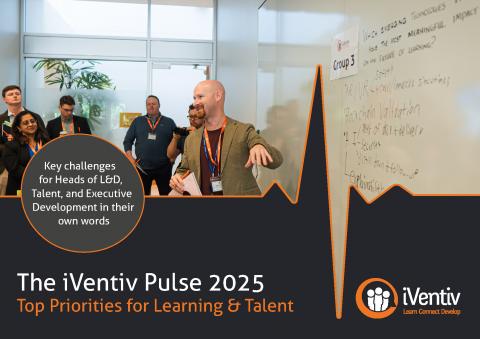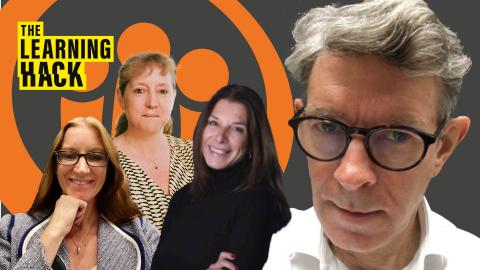Submitted by Kerry Summers on
When was the last time your Learning or Talent team actually learned together, not just bonded over a quiz night or swapped small talk over dinner—but shared real expertise, solved real problems, and left more aligned than before? In global L&D functions stretched across continents and agendas, the difference between “team building” and “team learning” can define whether your next offsite creates momentum or just memories.
This blog explores why that distinction matters, how to choose the right approach for your goals, and what it takes to design gatherings that deliver more than connection—they deliver capability.

What is ‘Team Building’?
Team building refers to structured activities designed to improve interpersonal relationships. The goal is positive sentiment, psychological safety, and stronger human connection.
Whether through outdoor adventures, games, cooking classes, or social events, team building is fundamentally interpersonal. Performance impact is indirect. The hope is that better relationships translate into improved collaboration.
For distributed teams, these moments can be meaningful; humans work best with people they know.
Yet the challenge arises when this becomes the sole format for bringing the function together. Too often, L&D teams return from well-intentioned activities more connected socially, but no better equipped to deliver on the organisation’s strategic goals.
What is Team Learning?
Team learning is a much more deliberate intervention. It focuses on shared knowledge, shared expertise, and shared practice. The objective is direct operational impact. It helps people:
- Learn from real work and internal case studies
- Align on methods, tools, and language
- Close skill gaps that limit team performance
- Strengthen collaboration around business challenges
- Connect strategy to execution
Team learning uses structured dialogue and peer-to-peer exchange to move from theoretical knowledge into real adoption. It asks questions such as:
- How do we scale skills intelligence in a matrixed organisation?
- What are the patterns behind our most successful leadership programmes?
- How do we standardise learning data models across regions?
This is where an L&D team becomes more than the sum of its parts. Knowledge is not siloed in a corner of the business. Instead, success is replicated. Failures become shared learning, not duplicated mistakes.
Where team building improves how people feel about each other, team learning improves how people perform together.
When to Focus on Bonding vs. Knowledge Transfer
Executives often assume team building and team learning are interchangeable because both involve bringing people together. Yet each delivers very different outcomes. Choosing the wrong one leaves leaders frustrated and teams disengaged.
Here is a practical decision framework:
Choose Team Building When:
- The team already performs well, and relationships merely need strengthening
- You want to reinforce culture, belonging, and morale
- The goal is celebration or reward
- The pressure of day-to-day delivery has eroded trust or connection
Team building maintains emotional cohesion. It helps colleagues see one another as human again.
Choose Team Learning When:
- Your team must improve performance, not just connection
- Capabilities need to evolve at pace
- The business expects more strategic partnership from Learning and Talent
- Teams operate in silos and would benefit from shared practices
- There is a need to accelerate innovation or execution
Team learning recognises that large global L&D teams rarely struggle with motivation. They struggle with alignment.
The Hybrid Model: The Best of Both Worlds
Elite organisations blend the models. They design executive events for learning teams that include:
- Structured knowledge sharing
- Key business priorities and what they mean for L&D
- Internal case studies on what works in major markets
- Breakout problem-solving sessions linked to objectives
Followed by:
- Curated experiences that build belonging
- Social dinners
- Outdoor activities
- Cultural events
The structure respects a universal truth: Learning teams want to make an impact, and they perform better when they feel connected.
A meaningful hybrid event avoids the trap of scheduling content for content’s sake. It ensures learning is contextual, actionable, and tied to real work. Then it creates the social environment where relationships flourish and momentum builds.
How Do Stakeholders Define Success?
Misalignment between stakeholders is the number one reason offsites fail.
Why?
CEOs want clear strategic value; CHROs want cross-functional alignment and future-ready capabilities; Learning teams want practical solutions to their daily challenges.
If these signals are not decoded correctly, the outcome is predictable; Leadership perceives a fun but expensive gathering, and the team sees another corporate exercise with little relevance to their real work.
To design the right executive event, success needs to be defined explicitly and from multiple perspectives.
What Leadership sees as success:
- Measurable uplift in organisational capability
- Greater strategic influence from the L&D function
- Faster execution of transformation initiatives
- Cross-regional consistency and scalability
- Clear evidence of ROI
Team building alone rarely provides this evidence. Team learning can.
What L&D Teams See as Success:
- Solving a real challenge they currently face
- Understanding how peers tackle similar problems
- Practical ideas that can be applied immediately
- Recognition from leadership and peers
- A sense of community, not compliance
If teams do not experience meaningful progress in their own work, the event will fail to drive behavioural change. Someone might leave with a fun group picture, but not with a single new technique for building a skills ontology.
The winning formula gives both stakeholder groups what they value. This requires iVentiv’s event format:
- Peer-to-peer sharing on business-critical topics
- Structured alignment with organisational priorities
- Space to tackle individual challenges within a shared context
- Sponsorship and participation from leadership
- Design that balances productivity with pleasure
Through group breakout conversations, expert-led discussions, icebreakers, and collaborative exercises, iVentiv sessions ensure that executives gain confidence in the function, and teams gain confidence in themselves.
From Organised Fun to Organised Impact
The biggest frustration among senior L&D leaders is that despite leading capability uplift for others, they rarely get structured opportunities to grow themselves.
Large L&D teams need forums that treat their profession with the same respect they are expected to give the business, which includes:
- A safe environment to share failures without damaging credibility
- A mechanism for surfacing innovations across markets
- A shared language to execute global strategy effectively
- A support system to sustain momentum through change
This is the promise of team learning.
Organisations that get this distinction right transform their Learning function from a service provider to a strategic engine. The team becomes more confident, visible, and aligned. The business sees results, not just smiles in photographs.
Final Thought: Prioritise What Matters Most
When planning your next global gathering, ask a simple question:
“Do we want to feel closer, or do we want to perform better?”
If the answer is “both,” elevate your design approach. Treat the event as a strategic intervention, not an annual tradition. Put capability at the core. Then celebrate progress together.
In the era of AI-driven transformation, learning teams must model what modern learning looks like. They deserve opportunities to learn from one another, not just bowl together.
The future belongs to teams that collaborate, grow, and execute as one. That is the real difference between team building and team learning.
At iVentiv, we work with organisations around the world to design and deliver peer-led, insight-driven customer events that genuinely engage the C-Suite. If you're planning your next team learning event, let’s talk about how we can support you.
To enquire about iVentiv bespoke events, visit our enquiry page.
Related Resources
- Designing Events for Knowledge Sharing: Practical Techniques
- Solving the Knowledge Silo in Global Learning Teams
- What Makes an Effective Learning and Development Team Event?
- 10 Questions to Ask Before Planning an Internal Event
- Why Customer Education Matters
- Planning Corporate Events For Small Groups: A Complete Guide
- Why Internal Events Often Fail, and How to Fix Them
- How to Engage L&D Teams Through Events










